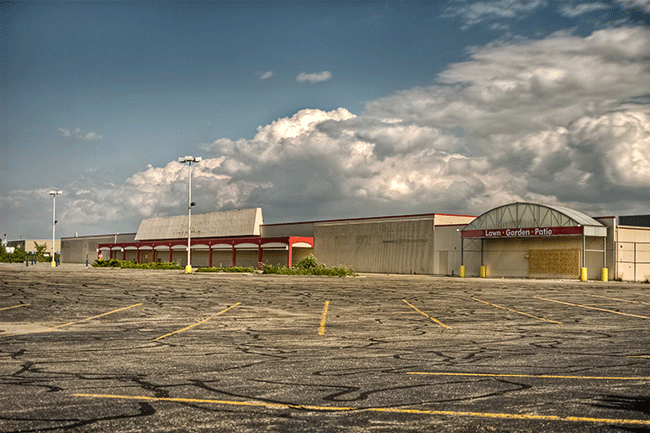by Rick Chromey
The news was shocking. On March 21, 2017, retailer Sears and partner company Kmart announced a full-blown financial pickle. Two days later USA Today chronicled the demise of a “giant of its time.”
Sears was founded in 1886 as a watch company and two years later launched a catalog that created customers. Within six years, the catalog was advertising “everything from sewing machines to sports equipment.” America was largely rural, and Sears revolutionized how retailers operated. They succeeded by engaging modern middle-class desires, mainstream print media, and mechanized business formulas.
Sears didn’t open its first store until 1925. Two years later they launched the Kenmore brand, followed by All-State insurance (1931) and the famous Christmas catalog (1933). By the end of World War 2, Sears was topping $1 billion in sales.
By then suburbia was bubbling in post-war America. Sears led the way and built new stores all over America (1946). They pioneered credit cards and innovated fresh brands like DieHard batteries and Craftsman tools. Sears could do no wrong. In 1973 they built the world’s tallest building: Chicago’s Sears tower.
But in the 1980s, the Sears brand fumbled. Despite their anchor store status at malls, Walmart was the new retail giant. People wanted “superstore” variety but with affordability and convenience. In 1991, Sears lost their “top-selling retailer” mantle to the Arkansas superstore. Three years later, Sears sold its namesake tower. In 1993 they stopped producing their catalog and moved the Christmas catalog online (1998). In the early 2000s Sears merged with Lands End (2002) and Kmart (2005), but profits continued to slide.
In the past four years, Sears has been selling everything just to keep the lights on. Nothing’s worked. In the fourth quarter of 2016 Sears lost $607 million. Christmas never came for Sears. Nor Kmart. Nor other juggernaut stores like Macy’s and JC Penney. The malls they anchor are also dying a slow death. Even Walmart has faced difficulty.
The new goliath is cyber store Amazon. Originally specializing in books, this online retailer now delivers groceries (something Sears originally did) and a zillion other things. Amazon gift cards are popular Christmas presents. The online retailer continues to rake in financial fortunes as it pioneers future home deliveries through automation (robots, drones, driver less vehicles).
It’s a jungle out there, and it’s called Amazon.
What can the church learn from Sears’ story?
- Reinvent or die. For most of its celebrated history, Sears innovated and led; but when it relaxed, focusing more on maintenance than mission, it lost traction. In a 21C culture that’s fluid, fast, and flexible, churches need to continually respond, reinvent, and re-imagine “wine skins” (not the Wine). The Message never changes but the models, strategies, styles, and frameworks do.
- Watch the lure of success. Pride comes before a fall, and Sears is a classic tale of hubris. Too many churches build towers rather than bridges, monuments rather than movements, and legacies rather than living vision.
- Know your culture. The same year Sears sold its tower (1994), Jeff Bezos launched Amazon.com. Three years later Sears finally entered dot.com world, but it was too late. Sears was tied to a dead man’s name. Amazon was the biggest river (and soon store) in the world. Too many churches overlook, dismiss, or oppose cultural changes when they need to interpret, understand, and embrace the opportunities change creates.
Ultimately, every living thing dies. It’s the way of the world. Just ask Kodak (another giant).
Fortunately, the Church is Eternal and Living. The Wine is always fresh. Sears simply teaches us that wine skins do fissure, fracture, and fail if we don’t pay attention.
Church, we need to pay attention.
[i] “Sears, Kmart May Lack Cash to Stock Shelves,” USA Today: March 23, 2017, B1-B3.


